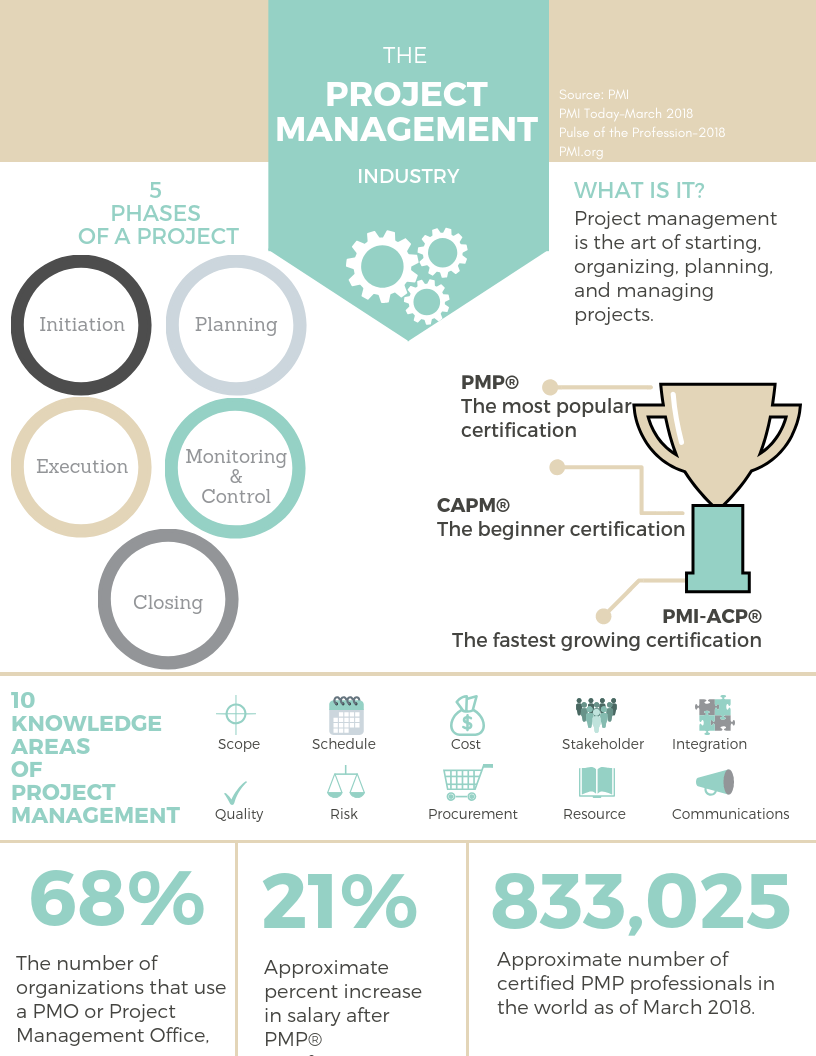How do you get a PMP certification?
To apply for the PMP ®, you first must complete the relevant work experience. There are two ways to qualify. An individual needs a high school diploma or associate’s degree and at least 7,500 hours of experience leading projects to qualify for the PMP ® exam. For individuals with a bachelor’s or graduate degree, the work experience requirement is only 4,500 hours.
Regardless of your training, you must complete at least 35 hours of training in a PMP ® program. After earning the required work experience and taking a PMP ® training program, you are ready to apply for the certification. Before you can take the exam, you must submit your application materials and pay the application fee.
According to PMI’s Certification Process guide, PMI approves most applications within 5-10 business days. A small percentage of applications are subject to random audits, which requires additional time to verify experience and credentials.
At NYIM, we help you complete the 35 required hours of training that you need before you can apply for the PMP ®. On the last day of the certification course, we help you submit your application materials to apply for certification, which you must do before receiving approval from PMI to take the certification exam. Our support does not end after the course. If you don’t pass on your first attempt, you can take advantage of your free retake included with your course fee and NYIM will cover the fee for your retake exam.
Is the PMP Exam difficult?
The PMP ® exam is a 200-question, multiple-choice exam that you have up to four hours to complete. Each multiple-choice questions offers four or five answer choices. It’s important to note that 25 of the 200 questions are sample questions intended for future exams that do not count towards your score. Distinguishing between the sample questions and actual exam questions is impossible. To pass the exam, you’ll need to answer at least 106 of the 175 questions correctly (approximately 60%).
All PMP ® exams are taken at a Prometric Testing Center. Before scheduling your test and choosing from available dates, you must submit your certification application to PMI, pay the application fee, and receive an official ATT (Authorization-To-Test) letter from PMI. The exam is pass or fail, and you will find out if you passed the exam right after taking it. You must bring two forms of ID to the exam, but you are not permitted to use and should not bring study materials nor a calculator during the exam.
To prepare you for the exam, we review strategies and tips to make the test format and content easy-to-understand. You’ll learn the best approaches to answer questions and time management, which is essential to perform well on the exam. Specific topics we cover include how to decide when to skip a question and move forward, how to use the process of elimination to determine the correct answer when you are unsure, and how to identify different types of questions. Time management is a crucial part of taking the PMP ® exam, and we will teach you how to maximize your exam hours so that you avoid wasting too much time on a single question.
What are the PMP exam questions like?
Eighty (80) percent of questions on the exam are related to the planning, execution, and monitoring and control phases of project management. Nearly one-third of the questions are related to the Execution phase of project management.
There are six types of questions that you’ll find on the PMP ® exam.
- Formula questions involve using specific formulas to calculate things like Schedule Variance (SV), profit and Cost Performance Index (CPI). While formula questions do require mathematical calculations, you cannot use a calculator during the exam.
- Situational questions require you to apply theoretical knowledge to a hypothetical situation. These questions are tricky in that more than one answer will seem correct, but there is always one option that is the best fit.
- Knowledge questions assess your ability to recall or recognize specific concepts in a hypothetical situation. You might be required to identify information from a graph or chart.
- Interpretational questions require you to use calculations, theories, and other facts to assess a project’s position or situation using the data provided.
- Technical questions require you to draw upon the expertise learned in the PMBOK ® guide to solve a project problem.
- PMBOK ® questions, like knowledge questions, evaluate your ability to recall information from the PMBOK ® guide, from which the exam draws its test content.
Throughout the course, we’ll teach you how to apply your real-world project experience to master theoretical questions on the exam. Aside from covering the knowledge areas and processes outlined in the PMBOK ® guide, we teach you how to distinguish between the different types of questions listed above. You’ll learn how to answer each specific question type, understand how to dissect the questions, and choose the best approach based on this knowledge.
The following free PMI resources are a great way to explore the exam:
- Review the Current PMP Exam Content Outline
- Familiarize yourself with PMP Sample Questions
How Much Does PMP Certification Cost?
Before taking the exam, it’s recommended to become a PMI member. The non-member exam fee is $555, while the PMI member fee of $139 and member exam fee of $405 is $544. Besides offering a better deal, by becoming a PMI member, you receive a host of benefits include a free digital copy of the PMBOK ® guide, an exam guide, and numerous other free resources to help you prepare for the exam.
Retake exams cost $275 for members and $375 for non-members. Most PMP certification courses do not include exam fees, as individuals need to register directly with the testing center and will pay different fees based on their membership status with PMI. PMI offers each student three attempts to pass the exam, and most certification courses offer a guarantee if you don’t pass the third attempt.
However, with NYIM’s unique passing guarantee, we will cover the cost of the $275 retake if you don’t pass the exam on your first attempt. Learn more about our passing guarantee.
How long does a PMP Certification last for?
Certified project managers must renew their PMP ® certification every three years. To renew the certification, a student must have at least 60 hours of PDUs (Professional Development Units) every three years. PMI members have access to free PDUs.













